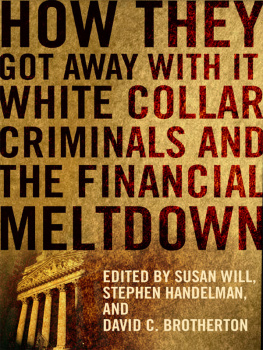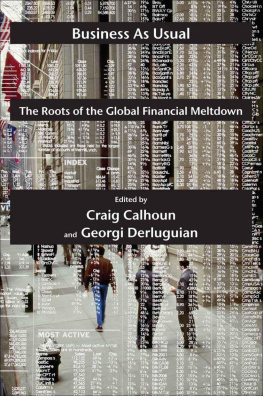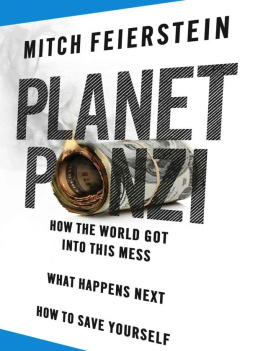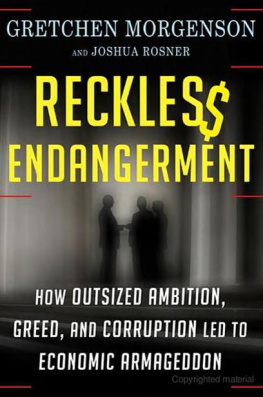How They Got Away with It
HOW THEY GOT AWAY WITH IT
White Collar Criminals and the Financial Meltdown
EDITED BY
SUSAN WILL, STEPHEN HANDELMAN, AND DAVID C. BROTHERTON
Columbia University Press New York
Columbia University Press
Publishers Since 1893
New York Chichester, West Sussex
cup.columbia.edu
Copyright 2013 Columbia University Press
All rights reserved
E-ISBN 978-0-231-52766-8
Cover photos: adam eastland/Alamy, Sieda Preis/Getty Images Cover design: Marc Cohen
Library of Congress Cataloging-in-Publication Data
How they got away with it : white collar criminals and the financial meltdown / edited by Susan Will, Stephen Handelman, and David C. Brotherton.
p. cm.
Includes index.
ISBN 978-0-231-15690-5 (cloth : alk. paper)ISBN 978-0-231-15691-2 (pbk. : alk. paper)ISBN 978-0-231-52766-8 (ebook)
1. White collar crimes. 2. Commercial crimes. 3. Commercial criminals. 4. Financial crises. I. Will, Susan. II. Handelman, Stephen. III. Brotherton, David.
HV6768.H69 2013
364.16'80973dc23
2012017414
A Columbia University Press E-book.
CUP would be pleased to hear about your reading experience with this e-book at .
References to Internet Web sites (URLs) were accurate at the time of writing. Neither the author nor Columbia University Press is responsible for URLs that may have expired or changed since the manuscript was prepared.
To the victims of corporate malfeasance
CONTENTS
We thank the McCormick Foundation for their financial support and the staff of John Jay College of Criminal Justices Center on Media, Crime, and Justice, who organized the April 2008 conference for journalists, academics, and other specialists, How Do They Get Away with It? Tracking Financial Crime in the New Era, which gave attention to the developing economic events.
We also thank our graduate research assistant, Alex Holden, who provided invaluable assistance. His organizational skills, attention to detail, and sheer endurance greatly facilitated the completion of this book. We greatly appreciate his devotion to this endeavor.
Finally, we thank the editors and staff at Columbia University Press who worked with us. In particular, we are grateful for Edward Wades patience and editorial attention to detail and the masterful copyediting by Ron Harris and Julie Palmer Hoffman.
In a 2011 New York Times article, the authors ask why no bankers have gone to prison for activities related to the financial meltdown (Morgenson and Story, In Financial Crisis, No Prosecutions of Top Figures, April 14, 2011). Such a question, raised by one of the leading newspapers in the United States, goes to the heart of this volume: How did the movers and shakers of a world financial and economic system make the decisions they did, creating untold social harm to millions, and yet fail to be held accountable by our various governments?
This book grew out of an initiative we took at John Jay College of Criminal Justice in 2008 to organize a conference for journalists, academics, and practitioners that would shed a criminological light on one of the biggest economic crises in U.S. history. Given that we were located in the eye of the storm (a twenty-minute subway ride from Wall Street) and as faculty members of the largest college of criminal justice in the nation (with a commitment to educating for justice), we felt compelled to put into context the social, political, and economic processes behind the meltdown and show culturally how this epoch had come about. At the time, we thought that academics were paying scant attention to the extraordinary events of 20072008. Although hundreds of column inches, hours of broadcast time, and millions of cyber pixels were produced by investigative and other journalists, there was too little commentary or serious analysis from those of us who were supposedly trained to investigate scientifically the nature, type, and meanings behind the egregious transgressions that constituted this most recent rupture in the fabric of global capitalism.
Needless to say, the conference was a tremendous success. As financial regulators, journalists, criminal investigators, criminologists, sociologists, rehabilitated Ponzi schemers, and accountants aired their perspectives, participated in heated debates, and dialogued with rapt audiences of several hundred students, faculty, and lay members of the public, it was clear that we needed to produce a compilation of the contributions heard that day. But we also felt called to push the exploration further, with rigorous analysis of the criminality that lay behind much of the crisisan aspect that while frequently touched upon by journalists and commentators has not received the attention it merits.
Some of the authors who contributed essays to this volume were present at the event. Others sent us their analyses on hearing of our intention to launch such a project. The result, we believe, is an extraordinary document that will well serve students, academics, and laypersons alike in their quest to understand the complexity of the issues behind the systems partial collapse and the policies that we might consider if history is not to move so assuredly from tragedy to farce.
In the opening section of the book, we have assembled contributions addressing the roots of the crisis as their foundational theme. Here David O. Friedrichs, Saskia Sassen, Susan Will, and Jock Young, through their respective disciplines, pursue a series of distinctive inquiries that have emerged from the seismic shifts in the worlds political economy located at its financial heart. Friedrichs begins by asking: Who or what is responsible for the financial economic debacle? The author makes clear that the crisis falls classically within the purview of white collar criminology and goes on to suggest several reasons why hardly a single perpetrator spent a night in one of the United States infamously overflowing prisons.
) now famously contained in her notion of global cities. These two logics produce conditions, beliefs, policies, cultures, and spaces that give rise to the now-ubiquitous dynamic of financializationa reference to the ascendancy of finance capital over industrial capital and the consequent liquid culture of superexploitation that now overdetermines outsourced, overproducing, and undercompensated labor.
Will, a criminologist, suggests that Ponzi scheme practices are not the exception but the rule in contemporary capitalism. From the operations of Sanford and Madoff to the institutionalized promises of public pensions, Ponzi-like properties abound in the way we do business as well as in the provisions of the social contract. Will makes the important point that with the U.S. government so impossibly intertwined with the goals, motives, and culture of the financial economy, the people have lost the guardian of their supposed interests. Thus, we have moved irrevocably from a government of, by, and for the people to one that is beholden to the profit-based diktats of financial corporations, stockholder interests, and the well-connected individuals who occupy Americas boardrooms, many of whom now seem to routinely shuttle between their desks in the White House and their offices on Wall Street.
Rounding out this opening section, Young complements Wills insights and argues that the present crisis must be seen as a facet of the generalized condition of anomie that has afflicted the United States for many a decade. Young invokes Mertons renowned 1930s sociological analysis of the impossibility for many citizens of reaching the mythic American Dream, despite the key role of this concept in the nations ideology, and he underlines Mertons well-respected conclusion that this contradiction has consistently produced a moral crisis of immense proportions. It is this moral crisis, according to Young, which is reflected in the culture of the present financial-economic crisis, as we watch the wanton criminality of the well-heeled who, for the most part, are feted and extolled by a craven culture of excess, greed, and human speculation. As Young explains, great wealth, as Merton pointed out, is itself seen as a sign of some inner virtue, regardless of how it has been accumulated (). This virtuous accumulation was present in the unabashed lifestyle of Madoff et al., consistently packaged and circulated by such entities as the News Corporation, whose dynastic heads during the summer of 2011 were exposed for their venality. These business cultural practices, according to Young, cannot be otherwise in advanced societies whose class structures have become more unequal than at any time since World War II.







